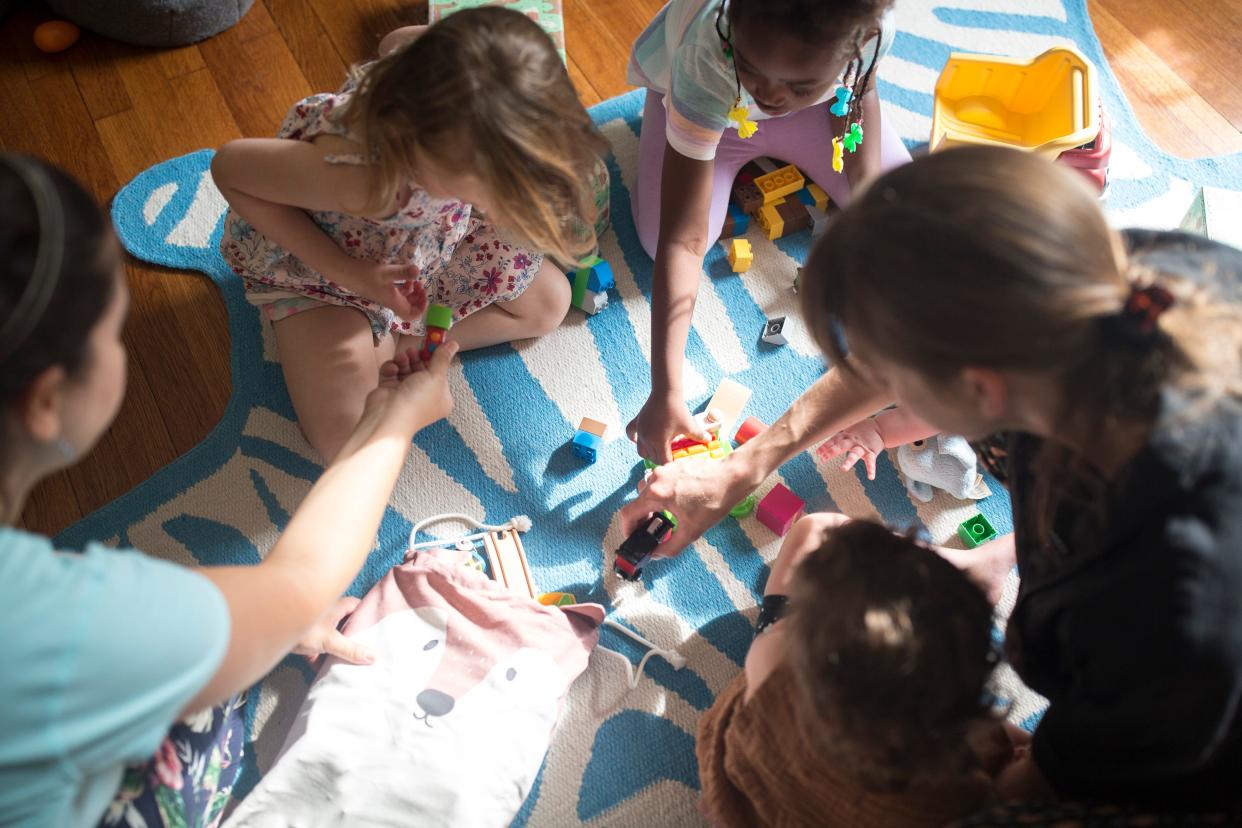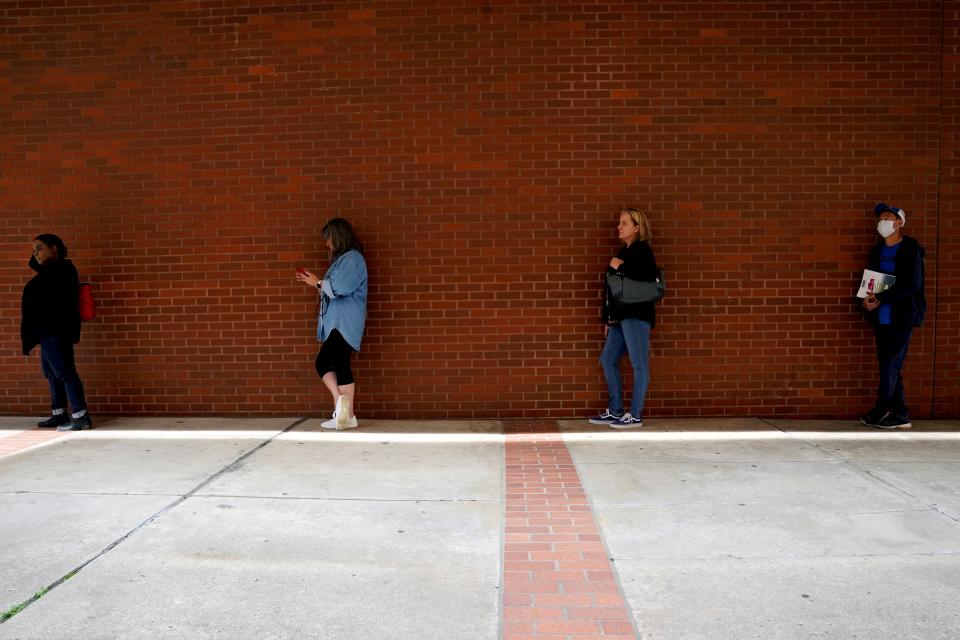The coronavirus triggered 'sudden and devastating unemployment' among nannies, most of whom are women of color and their families' primary wage earners

Brianna Soukup/Portland Portland Press Herald via Getty Images
The pandemic has taken a toll on nannies, many of whom have described being furloughed, laid off without pay, or forced to choose between their jobs and health.
This demographic, which is largely made up of women of color, "experienced sudden and devastating unemployment and underemployment," said Haeyoung Yoon of the National Domestic Workers Alliance.
Undocumented nannies are at risk because they're paid off the books and aren't eligible for unemployment benefits.
Michelle Brown believes she got lucky.
She's been a nanny with the same family for over six years. They live walking distance from her Upper East Side home, attended her wedding, and treat her like she's part of the family.
When the coronavirus hit, they asked Brown, 35, to stay home and continued paying her.
Thousands of other nannies have had a dramatically different experience.
"As soon as the shelter-in-place orders went into effect for people to stay at home, domestic workers, and in particular nannies, experienced sudden and devastating unemployment and underemployment," said Haeyoung Yoon, senior policy director for the National Domestic Workers Alliance (NDWA).
Brown has created a Facebook page called The Nannies of New York City! and with over 7,500 members, the painful stories have been pouring in.
Nannies realize they're 'disposable'
Some nannies were furloughed, while others were laid off without severance pay. Over a dozen nannies from the Caribbean have even lost their lives to COVID-19, The Cut reported.
"In the end, it doesn't matter how long you're with the family, you are disposable," Brown told Business Insider. "That's something that all of us nannies have learned."
As schools around the nation were shut down in response to the coronavirus, nannies, who lived in their own homes, were asked to become "live-in" nannies in so they could take care of the employers' children. Often, Brown said, they were forced to choose between their health and financial security.
"One family went so far as to tell their nanny, 'We're going to pack up everything and move to the Hamptons. You have to come and live with us, and if you don't, you can walk right out that door,'" Brown said.
The nanny in question had been using public transit to get to and from work while battling concerns about contracting the virus herself and bringing it home to her own children.
"The nanny was very, very afraid to come in, but she needed the money," Brown said. "So she kept going in until the very end. That was very hard for the nanny because she gave her time and love to these children, only for the family to turn around and say, 'Either you live with us or you can get going.'"
Nannies are mostly women of color and their families' primary breadwinners
The United States is home to over 2.2 million domestic workers, which includes nannies, house cleaners, and care workers, according to a study by the NDWA and Economic Policy Institute.
—Ai-jen Poo (@aijenpoo) April 8, 2020
A whopping 91.5% of this demographic are women and three out of four domestic workers are their families' primary breadwinners. The median age for domestic workers is 45 and most are Hispanic, black, or Asian women, the study found.
It also showed that 52% of 16,000 surveyed domestic workers said they didn't have work during the week of March 30 and that number rose to 68% the following week.
Some 66% of workers are uncertain whether they'll have jobs when the pandemic ends, the study said, and over 55% of workers said that they couldn't pay rent in April.
Roughly a third of domestic workers are born abroad, and one in five isn't a citizen of the United States, the study said. About 95% of nannies are paid off the book or illegally, the International Nanny Association said, which makes this group ineligible for unemployment insurance, stimulus checks, and other government benefits.
"They were told by their employers that they shouldn't come to care for their children," Yoon said. "There was no conversation around, 'I'm going to continue to pay you while you're going through this pandemic.' It was just, 'Don't come anymore.'"
The pandemic has spurred economic insecurity
For a group that's plagued by low wages, a lack of job security, and no benefits or safety net, the coronavirus has triggered tremendous financial insecurity, forcing workers to question how they will afford rent, feed their families, and pay bills.
Asked about the existence of these chronic problems, Yoon said, "Domestic work in this country has been greatly devalued."
Taking care of children can involve everything from early childhood development to newborn care and nutrition. But being a nanny isn't seen as work that merits compensation because it occurs in somebody's home and people don't necessarily identify someone's home as a workplace, Yoon said.
Historically, domestic work has its roots in slavery — black women worked in fields as farm workers or in homes as nannies — so it carries the "legacy of who is doing the work," she added.
In modern times, Yoon said, the issues have their roots in gender inequality. Work carried out by women isn't viewed as "real work" in quite the same way as men who go out and do a job. Nannies take care of children and that's seen as work that women must do — all of which renders this type of work "invisible," she added.
This background has translated into systemic and structural labor issues, Yoon said, so nannies are excluded from basic employment laws that govern minimum wage and overtime pay. They're also not able to organize or form unions.
And the pandemic has exposed these pockmarks that riddle the care industry.

Nick Oxford/Reuters
Nannies enable other workers to go out and do their jobs
In all 50 states in the US varying degrees of coronavirus-related restrictions have been lifted, and some nannies are being called back to work, which is a cause for concern in the absence of anti-viral treatment or a vaccine.
"The reality is that the coronavirus doesn't discriminate," Yoon said. "We're all in this together — the person next to me is as safe as I am."
The NDWA is putting together guidance on what it would take to offer nannies a safe workplace, but Yoon said the government needs to invest in the care industry as a way to course-correct during the economic downturn.
"We know that part of the solution is for people to go back to work and earn wages," Yoon said. "And domestic workers are critical to that economic recovery in that they enable other people to go out and work."
The goal, she said, should be that every person in the US has the necessary assistance to get through this pandemic safely. Nannies would benefit from widespread testing, hazard pay, and access to personal protective equipment, Yoon said.
For her part, Brown wants one fact to govern the way families treat their nannies during and after the pandemic.
"We're not your help," she said. "We're human beings before anything else."
Read the original article on Business Insider

